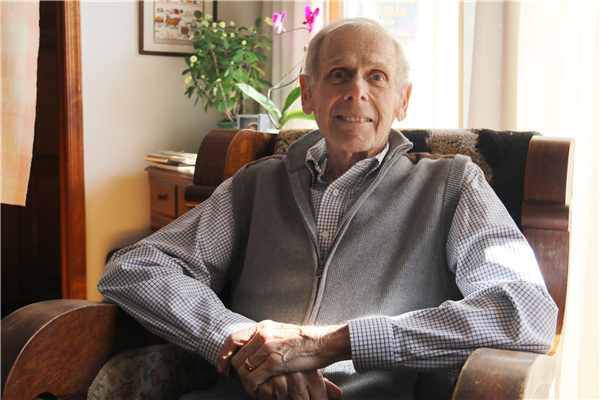Mission accomplished
By Zhao Xu | China Daily | Updated: 2019-03-19 07:20

As one of the patent holders for the vaccine's purification process, his professional background made him an ideal participant in the China project. But that was not all.
"I volunteered myself like crazy," he says. "What I saw was a continuation of my own, and my family's, China story."
In 1914, an American doctor named Fred Wampler - Eugene Wampler's uncle - traveled to China to open the first Western hospital in Shanxi. Five years later, he was joined by his younger brother Ernest Wampler, who also brought along his wife, Vida Wampler.
Partly responsible for the construction of a 121-kilometer long road designed to combat a local famine by facilitating transportation, Ernest Wampler had no choice but to leave China for the US in 1922, when his wife, who was suffering from tuberculosis, grew more ill. She died later that year.
In 1928, Ernest Wampler married Elizabeth Baker, who had once worked at the hospital founded by Fred Wampler. The next year, the newlyweds returned to China, where she eventually gave birth to Joe and Eugene.
Both boys were given Chinese names: Wang Jinbao for Joe and Wang Jinde for Eugene. While the surname Wang was a phonetic twist on "Wampler", the Chinese character jin is the abbreviation for "Shanxi".
A short documentary written and narrated by Eugene Wampler last year includes black-and-white footage showing Ernest Wampler, shovel in hand, scattering chaff into the wind.
"Evangelism was the main purpose of my father's work as a missionary. But growing up on a farm, he could easily relate to the local peasants, with whom he built a bridge of trust through agricultural work," says Eugene Wampler.
The couple also sought to help improve local revenue by crossbreeding an indigenous stock of sheep with Merino sheep, which are prized for their wool. Today, one reminder of that history hangs in Eugene Wampler's home in Lower Salford Township, Pennsylvania: a wool curtain woven by a local woman and given to the couple before their departure in the late 1930s.
On July 7, 1937, Japan invaded China. But Ernest Wampler and his wife were not deterred. A picture taken at the time shows Elizabeth Wampler, dressed in a nurse's uniform, tending a severely burned bombing victim.
Life in the war zone was perilous. They had their first near-death experience when, according to Eugene Wampler, a Japanese bomb landed in the courtyard of their family home.
"When she heard the approaching airplanes, my mother took me from my afternoon nap in the crib and carried me downstairs," he recalls. "While we crouched between the downstairs windows, the bomb landed and the room was filled with dust and debris ..."
"Then amid all that confusion, my mother heard a voice ask: 'Mommy, am I dead?' That was my brother, Joe."
























